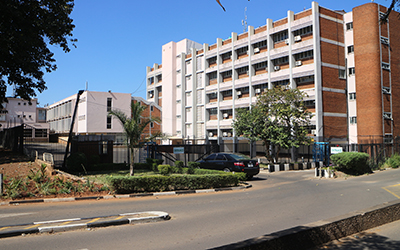Blog
Will a revenue boom support development in resource-rich economies?
The post-COVID-19 economic recovery and Russia’s war with Ukraine have caused some natural resource prices to reach new highs. Although forecasting the price of internationally-traded commodities is notoriously difficult, recent estimates suggest that prices will remain high through 2024. The high prices of fossil fuels, in particular, have caused inflationary pressures on Western economies. High natural resource prices may, however, be a blessing for exporters.
According to an IMF policy paper, there are over 50 developing and emerging economies that are resource rich—many of them are in Africa. A natural resources boom presents an exceptional opportunity for such economies to transform public finances. For heavily-indebted countries, it is an opportunity to repay creditors. Argentina, a new lithium and gas exporter, is one example. Above all, a spike in natural resources prices may translate into much-needed revenues, but will resource-rich economies be able to take advantage of this opportunity?
Natural resources: curse or blessing?
Resource-rich countries are often seen as special economies. Typically, their economies have a large share of extractive industry, with both exports and public finances depending on the sector. Their governments tend to be financed more by resource revenues than through direct or indirect taxation. We often hear that being resource-rich may undermine economic growth, but we know less about how resource endowments impact human development outcomes.
 Relying on natural resource revenues to fund human development is a risky proposition, mainly because of the volatile nature of resource revenues. Volatility in prices and uncertainty about the magnitude and production of extractive resources makes it intrinsically difficult to predict the flow of these revenues. Price spikes often lead to overly optimistic economic expectations. Consequently, governments are easily tempted to overspend or borrow in expectation of a prolonged boom that may never materialize.
Relying on natural resource revenues to fund human development is a risky proposition, mainly because of the volatile nature of resource revenues. Volatility in prices and uncertainty about the magnitude and production of extractive resources makes it intrinsically difficult to predict the flow of these revenues. Price spikes often lead to overly optimistic economic expectations. Consequently, governments are easily tempted to overspend or borrow in expectation of a prolonged boom that may never materialize.
Likewise, the nature of the politics of resource-rich economies can be a problem. Political elites may divert a significant proportion of revenues derived from resource extraction to patronage instead of education, health, and social transfers that could contribute to poverty and inequality reduction. This view, however, is increasingly challenged. Indeed, recent research from UNU-WIDER suggests that the reality is more subtle. Some resource-rich economies are quite effective at turning subsoil resources into above-ground assets to support human development; others aren’t.
What are the conditions for countries to achieve their development goals?
When can resource-rich countries take advantage of a natural resource boom? This, of course, depends on national elites’ commitment to development, but also on the type of state and quality of their political institutions. Countries with more effective states are more likely to reap greater benefits from resource revenues.
For example, during the Millennium Development Goals period (2000–2015), income poverty fell more in countries where state institutions were able to ‘get things done’. Hence, effective states are likely crucial to the achievement of the Sustainable Development Goals.
 Political institutions that place effective constraints on rulers can play a major role in the emergence and development of effective state institutions, because they diminish the concern that state resources are used in the interest of a particular incumbent group. For example, in parliamentary systems, an effective parliament can institutionally oversee and audit the state budget. This implies that, rather than using resource windfalls on patronage, the executive is more likely to promote an effective and independent civil service and so deliver effective public financial management.
Political institutions that place effective constraints on rulers can play a major role in the emergence and development of effective state institutions, because they diminish the concern that state resources are used in the interest of a particular incumbent group. For example, in parliamentary systems, an effective parliament can institutionally oversee and audit the state budget. This implies that, rather than using resource windfalls on patronage, the executive is more likely to promote an effective and independent civil service and so deliver effective public financial management.
This may explain why fossil fuel exporters like Nigeria and Indonesia, although they have a similar reliance on natural resources, perform differently in key aspects of state effectiveness such as the ability to raise revenues from taxation—which is significantly higher in Indonesia, where checks on the executive power are historically stronger—and to reduce poverty.
We should be mindful of these structural conditions—how effective states are in resource-rich economies and whether check and balances play significant role in political life—that are needed for countries to achieve their development goals. The conversation should focus more on these factors, to build awareness and political support for using income from natural resources as a leverage for human development.
Antonio Savoia is a Senior Non-Resident Fellow at UNU-WIDER and a Researcher in development economics at the University of Manchester's Global Development Institute.
Tania Masi is an Assistant Professor in Economics at the Università degli Studi 'G. d'Annunzio' Chieti – Pescara.
Roberto Ricciuti is Associate Professor of Economics at the University of Verona, Deputy Director of the PhD in Economics and Finance and fellow of CESifo.
Kunal Sen is Director of UNU-WIDER and Professor of Development Economics at the Global Development Institute (GDI), University of Manchester.
The views expressed in this piece are those of the author(s), and do not necessarily reflect the views of the Institute or the United Nations University, nor the programme/project donors.
 Join the network
Join the network









